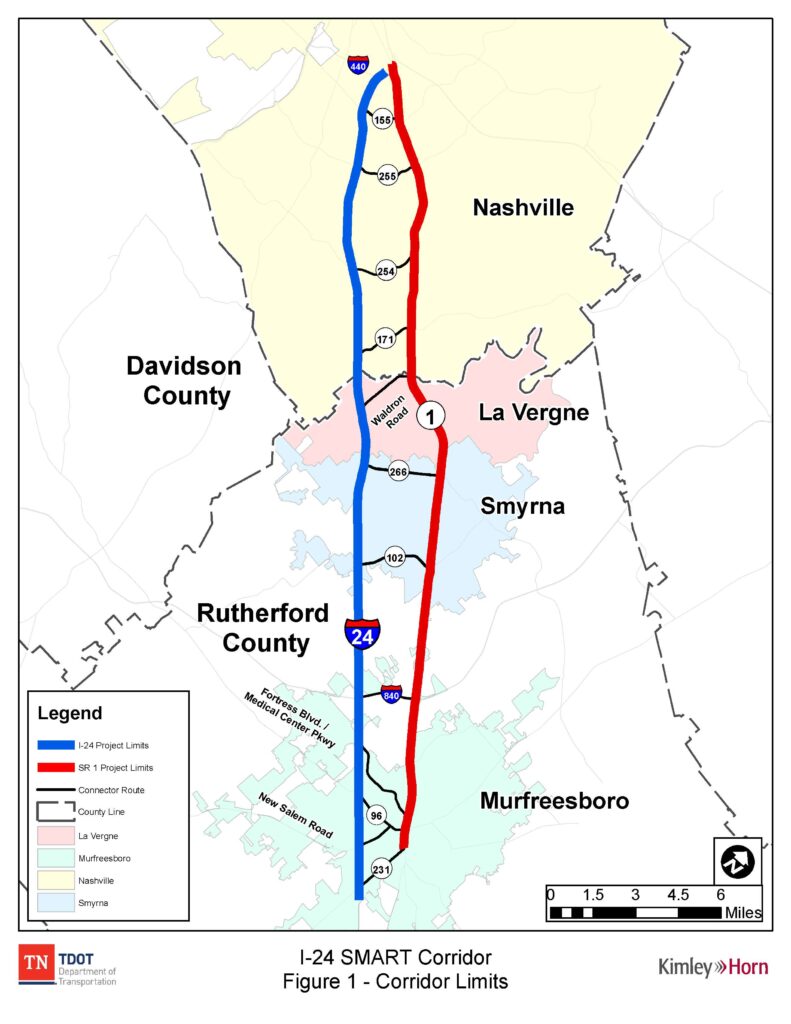Trevor Jones | October 26, 2022

If you’ve ever driven out of Nashville and towards Chattanooga on I-24, you are probably familiar with the traffic that plagues this section of the highway. Due to the rapid growth of both Nashville and Chattanooga in recent years, this section of I-24 has been experiencing more and more traffic, often creating large traffic jams in the event of an accident or construction. The traffic has gotten so bad that one major research center at Vanderbilt, the Institute for Software Integrated Systems (also known as ISIS), is seeking to tackle the problem using complex software and hardware systems.
ISIS is an electrical engineering and computer science-based research center here at Vanderbilt that performs cutting-edge research across a variety of different areas. These areas include system security, wireless sensor networks, and cyber-based physical systems such as robots or self-driving cars.
Due to the out-dated state of most transportation technology, this institute’s research is highly relevant, providing solutions to current issues with transportation within society. As a result of Vanderbilt’s $100 million investment in the growth of the Computer Science department at Vanderbilt, ISIS is growing at a quick rate. Other research centers, such as the Institute for Space and Defense Electronics and the Data Science Institute, accompany ISIS in their involvement with the Computer Science department at Vanderbilt.
Josh Scherer, a Computer Science and Applied Mathematics double major and junior at Vanderbilt, worked on the I-24 Smart Corridor project with ISIS over the summer. According to his insight on the project, it focuses on a 28-mile stretch of I-24 between Murfreesboro and Nashville and seeks to move traffic flow quicker during an “event”. Such events involve accidents, construction, and anything else that has a negative impact on the flow of traffic. When these events occur, the Tennessee Department of Transportation (TDOT) communicates the type and location of the event to a project system created by ISIS. This project system uses artificial intelligence (AI) to optimize traffic patterns. The project’s artificial intelligence uses past data regarding what makes traffic move quickly through this section of highway to inform how it will “set” the components of the “Smart Highway” to deal with this provided event. The main components this system works with are digital speed limit signs and dynamic lanes (pictured), which can both be changed at any moment, using software, to alleviate traffic jams. Utilizing previous traffic flow data and TDOT’s current reports on “events”, the project thus changes the functionality of highway lanes and speed limits to improve the flow of traffic.
During his involvement with ISIS, Josh focused on the architecture side of the I-24 Smart Corridor project. When interviewed, he said, “[at ISIS], I focus on taking in the information from the TDOT, making that information usable, sending it to the AI [infrastructure], getting the response and sending it out in a form that is understood by all parties involved.” All of this data manipulation – gathering relevant information, sending it to the artificial intelligence system to be processed, and getting an understandable response – seems intuitive on the surface. In reality, however, it can take many months to get done, according to Josh. When asked what his favorite part of this project was, Josh responded that it was the functionality and applicability of his work: “When we’re doing schoolwork, we’re just presented with a problem and we come up with a solution and that’s it. We don’t consider all the complexities that come with solving a real life problem…That could be how you get the information, how you process it, how you send the information off, how you communicate your solution.”

ISIS performs industry-leading research in a number of relevant Computer Science focuses. The institute offers undergraduates both summer internships in Nashville and opportunities for research abroad at the Technical University of Munich in Germany. Check out their current projects and more information here on their website.
References
About Isis. School of Engineering. (n.d.). Retrieved October 10, 2022, from https://engineering.vanderbilt.edu/innovations-2013/about-isis.php
Artificial Intelligence-powered decision support tools for Integrated Corridor Management. Institute for Software Integrated Systems. (n.d.). Retrieved October 10, 2022, from https://www.isis.vanderbilt.edu/projects/ICMDSS
Coyle, P. (1970, August 18). New departments answer growing demand in computer science, Computational Science, Electrical Engineering. Vanderbilt University. Retrieved October 10, 2022, from https://engineering.vanderbilt.edu/news/2021/new-departments-answer-growing-demand-in-computer-science-computational-science-electrical-engineering/#:~:text=The%20%24100%20million%20investment%20in,science%20faculty%20over%20three%20years.
ISIS Homepage. Institute for Software Integrated Systems. (n.d.). Retrieved October 10, 2022, from https://www.isis.vanderbilt.edu/
TDOT. (n.d.). 1648219087994. TDOT. Retrieved October 10, 2022, from https://www.google.com/url?sa=i&url=https%3A%2F%2Fwww.tn.gov%2Ftdot%2Fnews%2F2022%2F3%2F25%2Fi-24-smart-corridor-phase-2-gantry-construction-to-begin.html&psig=AOvVaw1oJX17XNzveNBTFOVfpBDo&ust=1665546422222000&source=images&cd=vfe&ved=0CAsQjRxqFwoTCJDu8Iei1_oCFQAAAAAdAAAAABAD.
TDOT. (n.d.). I-24_SMART_Corridor_MAP. TDOT. Retrieved October 10, 2022, from https://www.tn.gov/content/dam/tn/tdot/region-3-documents/I-24_SMART_Corridor_MAP.jpg.
